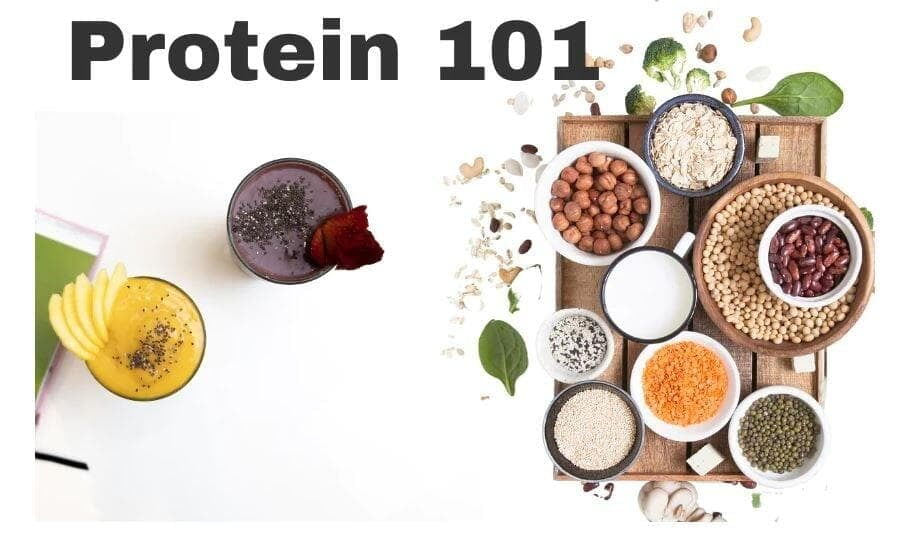We hear proteins are the “building blocks of the body” but how does this really work?

In this series I will be talking about the 3 macronutrients: Protein, carbohydrates, and fat (alcohol is also considered a macronutrient because it provides calories, but because it doesn’t add any nutritional value to the diet it won’t be covered in this series).
We hear proteins are the “building blocks of the body” but how does this really work?
When we eat proteins (for example a grilled chicken breast), we chew, we digest, and we break it down into its smallest molecule: Aminoacids.
If you think about a brick house, the house is the protein, and the bricks are the aminoacids that form the house or in this case, the protein… There are many types of proteins, just like there are many different types of houses or buildings (office buildings, rental houses, small and big houses, small and big buildings). All houses, at least in this story, are made of bricks (red bricks, white bricks, brown bricks), just as there are many types of bricks to build a house, there are the many different types of amino acids that form a protein.
It is difficult to make this simple, but just as reference, each protein needs at least 20 essential amino acids to form a complete protein. All animal proteins have complete proteins, vegetarian and vegan options sometimes need to be combined to fulfill the amino acids needed to form a complete protein.
So after we eat, say, a chicken breast and our stomach has done the work of breaking all the proteins down into amino acids, our body can absorb those amino acids and rebuild them into full proteins that our body needs. So in other words, we are breaking down a brick house (proteins) to get all those bricks (amino acids), so we then can build another house that is specific to what our body needs at that particular moment. That is exactly how proteins work.
I mentioned the different types of houses and buildings, some examples of proteins are the cells that make up our skin, muscles, bones, hair… But there are so many other proteins inside our body, here are just a few examples:
- Hemoglobin: This protein is found in red blood cells and is responsible for carrying oxygen to all the cells in your body.
- Enzymes: These proteins are important in speeding up chemical reactions in the body, one example is the enzymes needed to break down food in the digestive system.
- Collagen: Proteins that provide structure and support to your skin, tendons, and bones.
- Antibodies: These proteins help the immune system fight any foreign agent, such as viruses and bacteria.
- Insulin: This is a protein (also a hormone as it is part of the lymphatic system) that helps regulate the amount of sugar in the blood, by allowing sugar molecules to enter skeletal muscle cells.
But there are so many more ways proteins are used inside our bodies, it would take a book to explain each one of them. But you get the idea right? Proteins are the building blocks and they are made of aminoacids.
MUSCLES -of course- have most of the proteins that we produce.
How much protein do we need?
This is a topic of much confusion. The recommendation from the FDA is 0.8g of protein for every Kg of body weight… I personally believe that if you are working out regularly (at least 2 strength training sessions per week and regular physical activity) you can aim for 1g of protein per Kg of body weight daily.
For example, if your weight is 150 lbs, we first convert it into Kg (you can easily find a conversion tool on google), 150lbs = 68 Kg, you would need 68g of protein on a daily basis.
But if you are engaging in more than 2 strength training sessions per week, then you would probably need more protein as your body will be needing those aminoacids to build more muscle.
Some bodybuilders are ok eating close to 2g of protein per Kg of body weight, this is more than twice the amount recommended by the FDA, so this makes me want to reinforce how important it is to monitor your protein intake, workouts, and your body composition regularly to assess your intake need.
How your body reacts to protein intake will depend on:
- Daily exercise (type and time)
- Genetics and metabolic rate
- Daily intake (quantity and quality of food you eat regularly)
A personalized approach usually starts with general guidelines and changes as you move forward and towards your goals. My personal approach with our patients are Mindful Weight Loss is as follows:
Step 1: Get your current weight and if possible your body composition analysis.
Step 2: Track everything that you eat in one week, everything.
Step 3: Weigh in again in 1 week to assess your caloric needs
For body recomposition we will likely have a 40/30/30 macro ratio
40% of your calories from carbs (most right after your strength training session)
30% of your calories from protein (divided throughout the day)
30% of your calories from fat (we will focus on healthy fats such as avocado, extra virgin olive oil)
Have more questions or want more help? Call now to book your Health Coach apt today!
Our patients have unlimited health coach appointments and we love helping with nutrition feedback that is based on your goals, and workout protocols.
Carla Baccio is a National-Board certified Health and Wellness coach and has a master’s degree in Exercise Science, Nutrition, and Wellness from Liberty University.
